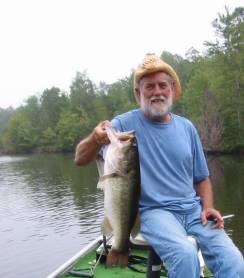
Small Lakes And Big Bass by Ken McBroom
article copyright
These days bass fishing is a wildly popular pastime with big boats and fancy reels along with more electronic gadgetry than a common man can even learn to use. We do our best, however, to keep up with the onslaught of lures and lines, rods and reels. Sometimes these things can get in the way of fun and isn’t that what we are out there for?
I have found over the years that small ponds whether it be an old farm pond or even just a water retention pond in the city, that these small bodies of water just might be something you want to add to your arsenal and leave a lot of the other things at home and just enjoy some good fishing with much less hassle.
Large impoundments all across America are seeing more and more pressure from anglers as well as boaters. The activity can really affect the fishing on any given lake. While these larger bodies of water are bombarded day in and day out the smaller lakes that dot the American landscape go unmolested. A little tough to use all that gadgetry on a 25 acre farm pond not to mention a 22 foot bass boat would seem a bit out of place, that is if you could even get the boat on the pond.
Baits for small lakes can vary just like on a big lake and a lot depends on the pressure that lake receives. Some small lakes get some pressure, especially retention ponds in the city as many kids and grown-ups flock to anywhere that allows for fun in the outdoors. Bait selection in these ponds can be a bit trickier than one that is tucked away on the backside of a 200-acre farm and hasn’t been fished in years.
 If you visit a popular pond where there are lots of anglers you will notice that a couple baits stand out, and they are usually spinners of all shapes, sizes and colors. These bass have been caught many times before and they know those spinners, so my favorite bait for these small waters is a plastic worm. Plastic worms are the toughest to learn to fish with and most people just out to have a little fun are not going to take the time to even learn to use this bait, so the bass have seen very few plastic baits in their lifetime. I assure you it makes a difference as it has been proven that bass can remember being stuck and what type of bait stuck them. Offer something new and your arm might just be tired at the end of the session.
If you visit a popular pond where there are lots of anglers you will notice that a couple baits stand out, and they are usually spinners of all shapes, sizes and colors. These bass have been caught many times before and they know those spinners, so my favorite bait for these small waters is a plastic worm. Plastic worms are the toughest to learn to fish with and most people just out to have a little fun are not going to take the time to even learn to use this bait, so the bass have seen very few plastic baits in their lifetime. I assure you it makes a difference as it has been proven that bass can remember being stuck and what type of bait stuck them. Offer something new and your arm might just be tired at the end of the session.
Many ponds are fairly clear around their bank and offer little in the way of visible structure. Invisible structure on the bottom of the lake can be probed with the plastic worm, rigged Texas style, even without a boat and fish finder. Work the entire pond meticulously as you feel the logs and other bottom structure with the weedless bait and after a few trips you will know the bottom of that particular body of water like the back of your hand helping you locate and land many more fish.
Gadgetry and fancy reels do have their place on small waters as well as big as there is a product line now that targets small water anglers and it can add to the fun. A small boat with electric trolling motor is all you need to get around a small lake. Fish finders can come in handy too in plotting the makeup of a lake and locating either the fish themselves or structure where fish are likely to be. Trolling can also be a very effective way of catching bass in a small lake especially if you are new to that lake. Trolling can point out specific areas of the lake that, for whatever reason, hold fish and you may want to target those sections and spend a little more time there and catch more fish.
Remember the world record bass came from a small lake in Georgia and the pending world record was caught from Dixon Lake, a 72 acre lake located in California. Bass can grow very large in small lakes as long as the forage is right, so don’t let the size of a lake fool you into thinking there are no fish in it because you never know, when that retention pond you drive by everyday and never see anyone fishing, might be home to the next world or state record. GOOD LUCK!
author website: visit | author bio
![]()

